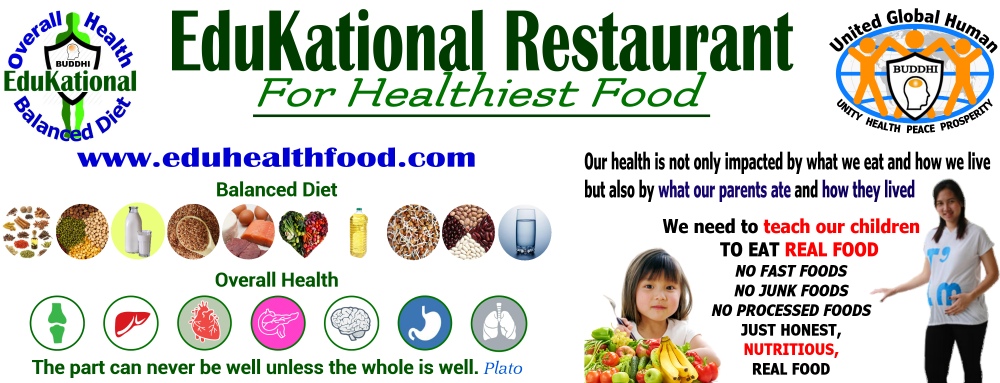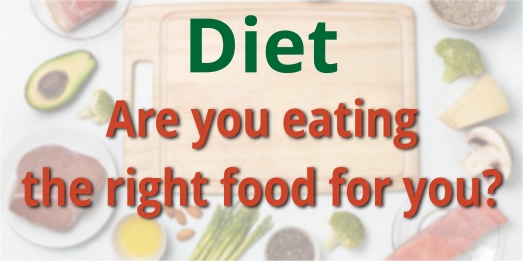
EduKational Health Article
Is too much protein bad for you?
The market for protein supplements is now mainstream – but many of us already eat twice as much protein as the World Health Organisation recommends

Should humans drink cow’s milk?
The consumption of cow’s milk is in decline as lactose intolerance does for dairy what gluten intolerance has done to bread. But if you are northern European, you are genetically modified to consume milk


Diet
What do people mean when they say they are "on a diet"?
Let's explore what Diets are all about
T
here is a lot of misunderstanding over the meaning of the word 'diet'. Most people tend to restrict its meaning to what they eat in order to lose
weight; however this is not the only meaning. In this article we are limiting the definition to mean foods eaten by people.
In relation to Diet, the Oxford English Dictionary gives the following definition:
- The kinds of food that a person, animal, or community habitually eats.
- A special course of food to which a person restricts themselves, either to lose weight or for medical reasons.
Looking at the first definition, it tells us that any food a person habitually eats will constitute a diet. Food is not defined in the definition so includes anything that is edible be it animal, vegetable or mineral considered either healthy or unhealthy.
don't be taken in by the people who claim to sell you 'wonder cures' or 'health in a bottle'.
The whole scope of Diets is vast, and promotes much controversy and debate; we are not going to enter this debate in this article so, therefore, the main purpose of this article is to raise awareness of the wealth of information available concerning diets. The amount of information - and often misinformation - available to us on diets, dieting, health and well-being is staggering; however, like all information, some will be reliable and some not, so you should only rely on information from trusted, accredited and wholly reliable sources; don't be taken in by the people who claim to sell you instant health promoting diets, 'wonder cures' or 'health in a bottle'.
See our article on health scams at: Cartoon illustration.

In relation to diets there are certain things we should consider; one is why people eat a certain type of diet. Reasons may be complex but are generally due to one (or more) of the following:
- Cultural norms
- Medical conditions
- Health concerns
- Sports
- Eating disorder
Cultural norms
As we know, many types of food, and the methods by which they are prepared and cooked, are specific to different parts of the world, even to specific regions within countries. Also, different cultures often dictate what types of food can and cannot be eaten.
In addition, 'typical' diets have been dictated by the availability of types of food, for example in Asian countries dairy farming has not been available so dairy products have not traditionally formed part of the habitual diet.
Children are often provided with foods as dictated by their parents and, as such, are influenced by the parents cultural norms, whims, fads and knowledge of foods that they eat.
Medical conditions
Certain medical conditions will dictate what foods may, and may not, be eaten as many will exacerbate or even induce certain medical conditions. People with diagnosed medical conditions will often be put on special diets as indicated by the condition and medications taken.
Health concerns
Many people undertake a change of diet due to health concerns, for example, excess weight.
Sports
Many dedicated athletes will eat certain types of food in order to help them in their chosen sports, for example body builders will consume enormous amounts of food that help to increase muscle bulk.
Eating disorders
People with eating disorders will generally fall into two groups, those that consume very little, or in extreme cases, no food and those that are unable to resist eating and 'binge eat' causing them to increase their body mass - usually by increasing the body's fat content. In most, although not all, cases of eating disorder there is an underlying mental health issue that needs to be addressed and or treated.
Whatever the reason for the type of diet you eat honest and trusted reseach overwhelmingly indicates that some types of diet are better for you than others.
Types of Diet
Here some example of different types of Diet:
Low Calorie Diets
The idea behind these diets is to eat fewer calories than the body needs, so that excess body fat will be burned for energy. Calorie reduction affects your metabolism and it may not suit your chemistry.
Standard Low Fat Diets
The belief that eating fat and cholesterol makes us fat and unhealthy became popular in the 1970's. Most reputable dietary advice states that eating high fat and cholesterol rich foods should be avoided.
Low-Fat Whole Foods Diet
The health benefits of this diverse family of diets, for example the 'Mediterranean diet', have lots of research behind them. These types of diet specifically encourage whole foods and discourages modern processed foods and refined carbohydrates, therefore this diet is substantially healthier than many typical diets.
Vegetarian Diets (Lacto-Ovo)
A desire for improved health is among the many reasons someone might choose a vegetarian diet. All foods except for meat are permitted. Dairy and eggs are generally allowed.
Vegan Diets
Among the reasons a person might choose to become a vegan, is the belief that a diet free of animal foods is best for the body, or because eating foods containing animal products is repugnant to them. However there may be health implications due to the long term effects of this way of eating.
Low Glycaemic Index Diets
The glycaemic index was developed in the 1980's as a way to distinguish "good carbs" from "bad carbs" by measuring how fast they enter the bloodstream.
Learn about this index and whether it can help your weight and health at:
Understanding Glycemic Index and Glycemic Load.
Low-Carbohydrate Diets
This particular diet was made popular by Dr. Atkins but has been used by physicians for over a century to treat obesity, diabetes, and other health problems.
Traditional Diets
This is how most people in the world ate between the time of the birth of agriculture (as long as 10,000 yrs ago) and the birth of industrial food processing (about 150 yrs ago). The main theme common to these diets is the absence of additional fats, sugars, sweeteners, preservatives, chemicals and high degrees of processing.
Palaeolithic Diets
A diet of whole animal and plant foods, free of dairy, grains, and legumes, is what our ancestors ate for nearly 2 million years and, as with 'Traditional Diets', there is an absence of 'artificial' ingredients.
Food Sensitivity Diets
Some examples are: Gluten-free, Casein-free, Rotation diets and Elimination diets. Any food can cause unwelcome symptoms, ranging from familiar problems like asthma to mysterious syndromes, such as fibromyalgia. Learn which foods are most likely to irritate sensitive individuals.

National Geographic Photograph: Matthieu Paley
In addition to the types of diet shown above there are a myriad of diets that claim various health benefits based on your body, for example blood type diet, ketogenic, MediFast, Taco Cleanse, Anti Ageing, and many more.
Some diets have been popularised and, to be honest, hyped up as wonder diets; although they may work for some, just because they are popular does not mean they are right for all - despite what the advocates profess. So ...
What can we ordinary people do?
- Exercise! Be active every day. Walk to school, sign up for a fitness class, find a sport you like, or dance in your bedroom. It doesn't matter what exercise you do - just make sure that it is appropriate to your health condition and that you stick to it.
- Eat a 'Balanced Diet' of healthy foods.
- Drink fat-free, low-fat milk, or water instead of sugar loaded soft drinks.
- Eat at least five servings a day of fruits and vegetables.
- Choose a variety of protein foods, like lean meat and poultry, seafood, beans, soy products, and nuts.
- Eat whole grains (like whole-wheat bread, brown rice, and oatmeal), that provide fibre to help you feel full.
- Eat breakfast. Studies show that people who eat breakfast do better in school, tend to eat less throughout the day, and are less likely to be overweight.
- Pay attention to portion sizes. There is often the temptation to eat a lot more of what you like as a portion, just because you like it, resist the desire to overeat.
- Avoid prepared packaged ready meals - buy and cook your own ingredients so you know what you are eating.
- Choose smaller portion sizes at restaurants. Avoid supersizing even if it feels like better value.
- Don't take diet pills or supplements, even ones you get over-the-counter. There is mounting evidence that taking supplements to enhance a type of diet provides no significant health benefits
- Avoid alcoholic drinks. Alcohol often contains lots of calories that can cause you to gain weight whilst not providing nutritional value.
Comment:
In conclusion, and looking at all the peer reviewed reliable evidence on healthy food and healthy eating, we recommend having a
'Balanced Diet' that contains all the recommended nutrition, elements and vitamins that your body needs,
but is suitable for your current health condition. For trusted on-line information on diet you should visit, for example the WHO web site.
We also recommend that you vary the types of food that you eat as this will ensure that you not only have variety in your diet but interesting meals
as well.
Recommendations
Before starting a new dietary regime we recommend that you speak to your registered medical doctor, health professional or dietician and seek
their advice. If you are on prescribed medication you must speak to your medical doctor before starting your new diet.
Under no circumstances should you stop taking your prescribed medication without seeking advice from your health professional.
At EduKational Restaurant we believe that to live a healthy life you should eat only natural, fresh foods prepared with as little processing as is possible and cooked (cooking is one method of preparation) as lightly as possible and using as little cooking oil as necessary.
See our article on 'Foods to Avoid' at:
http://www.eduhealthfood.com/article-foods-to-avoid.html
Dislaimer: Coosing a type of diet is complex and a certain type of diet may not be right for every individual. At Edukational Restaurant, we believe in providing you with honest information to make your own healthy choices based on a variety of eating patterns. As always, consult a healthcare professional before starting any new diet.
Recommended sites:
World Health Organisation - Healthy Diet
2015–2020 Dietary Guidelines for Americans







